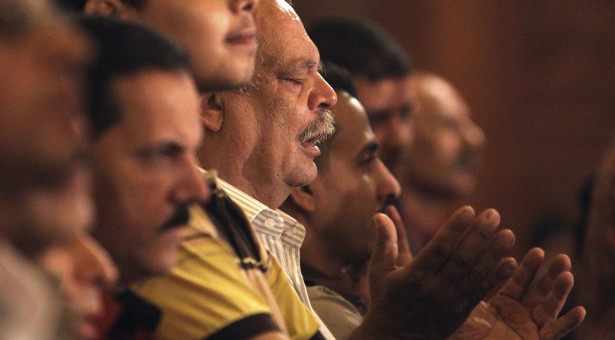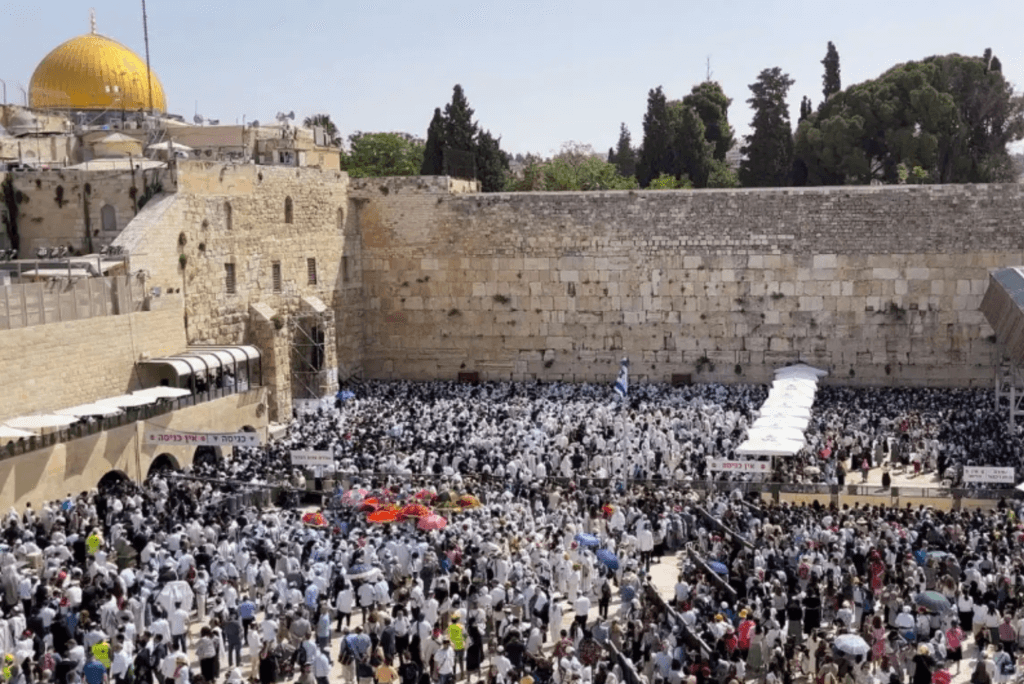As Egypt’s Islamists blame Christians for the ouster of Mohammed Morsi, anti-Christian violence has reached epidemic levels, with an estimated 82 churches across Egypt attacked and heavily damaged by pro-Morsi supporters in a mere 48 hours.
Unfortunately, the persecution of Christians is nothing new in Egypt or other Muslim-majority countries. But thanks to the mainstream media, few Westerners understand the true scale or nature of the horrors involved.
As you read this, Christians around the world are being murdered, raped, plundered, abducted, forcibly converted to Islam or otherwise oppressed by Muslims. Christians in Muslim-majority areas are some of the most vulnerable and horribly oppressed people on earth; they live at the mercy of the mob and receive little or no protection from the police or other government institutions.
The reach of this silent tragedy is sweeping—a global religious genocide on “slow burn” with occasional conflagrations that make it into the mainstream media. There are an estimated 100 million persecuted Christians.
This massive crime is documented in shocking and painstaking detail in Raymond Ibrahim’s new book, Crucified Again: Exposing Islam’s New War on Christians. The book is required reading for anyone who cares about religious freedom, human rights and/or the survival of Christians in their ancestral lands.
In Crucified Again, Ibrahim methodically presents overwhelming evidence of Muslim persecution of Christians (documented with about 700 footnotes). His exhaustive, scholarly and compelling study uses many news and historical sources and statements by contemporary Muslim clerics. The evidentiary details are far too numerous to summarize here, but a few examples stand out.
Ibrahim explains the theological basis for Muslim persecution of Christians. He notes the Islamic belief that Quranic verses from later in Muhammad’s career abrogate contradictory verses from earlier. The hostile verses naming Christians “infidels” occur toward the end of his career, so they override any tolerance for Christians given in earlier verses. Ibrahim writes: “The Koran’s final word on the fate of Christians and Jews is found in Koran 9:29 [where] Allah commands believers [to fight them] … ‘until they pay the jizya with willing submission and feel themselves subdued.’”
Ibrahim cites the writing of renowned Muslim scholar Ibn Khaldun (1332-1406):
“[Jihad] is a religious duty, because of the universalism of the Muslim mission and the obligation to convert everybody to Islam either by persuasion or by force. … The other religious groups did not have a universal mission, and the holy war was not a religious duty for them. … But Islam is under obligation to gain power over other nations.”
Ibrahim explains, “The Conditions of Omar … [details] exactly how [Christians and Jews] are to feel themselves subdued.”
The laws applicable to dhimmis (non-Muslims treated as second-class citizens under Islamic hegemony) made life so miserable for Christians over the millennia that these rules gradually transformed thousands of miles of formerly Christian territory into what is today known as the Arab world. Ibrahim also highlights a tragic historical absurdity: Many of the Muslims persecuting Christians today are themselves descendants of Christians who converted because of persecution.
Having established the theological basis for Muslim oppression of Christians, Ibrahim reviews the endless historical examples of these crimes. He cites one medieval Muslim historian who reported that “30,000 churches were burned or pillaged in Egypt and Syria alone” in just two years. During the Abbasid rule, in 936, “The Muslims in Jerusalem … burned down the Church of the Resurrection [believed to be built atop the tomb of Christ].” Ibrahim notes the “1453 conquest of Constantinople by the Ottomans and the subsequent attack on … the Hagia Sophia and its transformation into a mosque.”
After reviewing the more notable examples from history, Ibrahim catalogs the extent to which such Muslim persecution of Christians continues today across the entire Muslim world, “from Afghanistan to Zanzibar”—regardless of race, ethnicity, culture or language. Crucified Again details how these anti-Christian crimes are often incited by governments and/or religious leaders of Muslim countries.
Ibrahim “broke news” in 2012 merely by translating into English that Saudi Arabia’s highest religious authority declared it “necessary to destroy all the churches” in the Arabian peninsula. The shocking statement by Abdulaziz ibn Abdullah Al al-Sheikh, the Grand Mufti of Saudi Arabia, was widely reported by Arabic-language media, but the Western mainstream media avoided coverage of the outrage. As Ibrahim argues, the media willfully ignores such news because it contradicts their narrative that all Muslim violence is motivated by some socio-economic or political grievance.
But the West risks its own demise by ignoring four truths: 1) A hateful, absolutist ideology drives Islamist violence against non-Muslims; 2) Shariah’s draconian penalties for apostasy and blasphemy maximize Muslim demographic growth because nobody can safely criticize or leave Islam (including those converted under duress); 3) Shariah destroys the rights and freedoms cherished by the West; and 4) Shariah creates a Muslim monopoly on the marketplace of ideas—something antithetical to any free society. To survive, the West cannot let Shariah laws take root in Muslim-majority communities of Europe and North America.
With documented examples, Crucified Again also debunks the myth of the “moderate” Muslim state. So-called “moderate” states like Turkey or the Maldives may not be as atrociously violent toward their Christian minorities as countries like Pakistan, Iraq or Egypt are, but they follow the same patterns of anti-Christian persecution and are far from Western standards when it comes to treating their non-Muslim minorities with equal rights, justice and dignity.
Ibrahim has argued elsewhere that the Quran’s violent verses, unlike “their Old Testament counterparts … [use] language that transcends time and space, inciting believers to … slay nonbelievers today no less than yesterday.” According to Ibrahim, Old Testament violent verses are fundamentally different because they are merely a descriptive account of historical incidents—not a prescriptive exhortation to attack nonbelievers in the future.
Ibrahim shows how the Western media, academia and the Obama administration have all whitewashed Muslim oppression of Christians and/or supported Islamists like the Muslim Brotherhood to the point of enabling anti-Christian persecution and obscuring it from the public. Indeed, of Ibrahim’s 680+ cited news sources reporting on Muslim abuse of Christians, only about 6 percent were from the mainstream media. Biased media coverage of the Middle East deserves a book of its own, but to cite one powerful example (not mentioned in Crucified Again), consider how CBS’ “news” program 60 Minutesdefamed the only Mideast country where Christians are actually safe (Israel) while missing the real story of Mideast Christian persecution so thoroughly documented in Crucified Again.
Western passivity over the maltreatment of minority Christians has only encouraged Islamists to attack them for any perceived wrong by the West—whether it’s offensive cartoons, movies or any other grievance. Worse, the apathetic West has forgotten that the Islamic prohibitions against apostasy, blasphemy and proselytism used to justify Muslim oppression of Christians completely negate Western values like freedom of speech and religion.
Ibrahim elsewhere makes an excellent point about Muslim animus towards Israel: “If grievances … were really about justice and displaced Palestinians, Muslims—and their Western appeasers—would be aggrieved by the fact that millions of Christians are currently being displaced by Muslim invaders.”
Indeed, the truer explanation for Muslim hostility toward Israel is that it’s the only non-Muslim state in the entire Middle East and North Africa. As long as Israel thrives as a strong, non-Muslim state, the Islamist mission of global jihad has failed in that region where Muslims are strongest. But if Israel were ever to fall, one can only imagine the genocide that would descend upon Israeli Jews—and the Israeli religious minorities sheltered in Israel (Christians, Baha’is, etc.).
Despite the grim signs for the West, it’s worth noting that there is a tiny but brave reform movement within Islam that should be robustly supported. Courageous humanists like Irshad Manji, who questions received doctrines with critical thinking and a preference for tolerance over conquest, are the best hope for a reformed Islam that builds on its virtues, fixes its problems and is at peace with itself regarding the Sunni-Shiite divide and the non-Muslim world. Of course, anyone who reads Crucified Again will be unsurprised that Irshad Manji lives in the West.
Noah Beck is the author of The Last Israelis, an apocalyptic novel about Iranian nukes and an Israeli submarine with a diverse crew.
See an error in this article?
To contact us or to submit an article






















